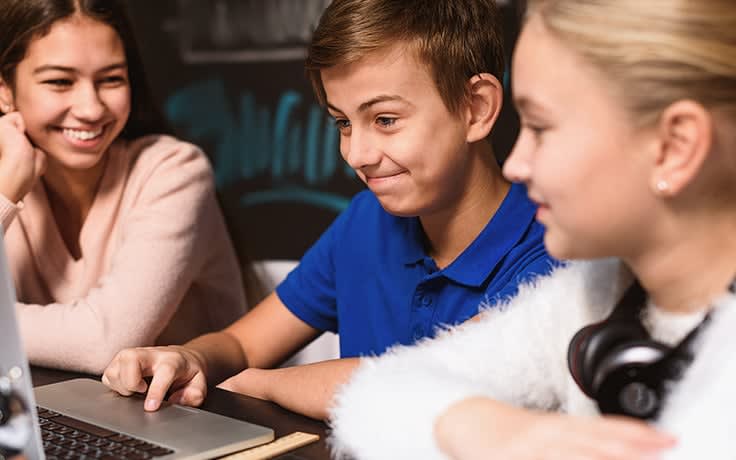Screen time is not all bad for our kids. When kids are watching or playing together with other kids, they are developing important social and cognitive skills. When they are engaged in studying, they develop different learning capabilities and when they study together in an online environment they get the chance to develop all of those skills together, or what we, at TEKKIE UNI call Digital Team Work.

The Digital Team Work skill is the most important educational challenge parents and teachers face nowadays.
At TEKKIE UNI, we look beyond a sole focus on the threat that screens present. Digital media are increasingly integrated into diverse aspects of family life – from video calls with relatives to homework submitted online – we found that ‘screen time’ should focus on the opportunities that digital media present to study, communicate, create, and mainly work together, bridging geographical distances.
We argue that when parents are told that their only role is to limit screen time, they are not able to help their children access the unique benefits offered by the digital age, the benefit of communicating with kids that share common interests and hobbies. And that instead of ensuring healthy social development, they prevent them from acquiring the tools of digital socializing.
Old theories, new times
In the 1980s, researchers at the Children’s Television Network discovered that kids learned more from the famous TV program ‘Sesame Street’ when they watched it together with their parents and friends. They called it “co-viewing”. Most experts agreed that co-viewing was better than placing kids in front of a TV program by themselves. They claimed that co-viewing reduces fear and aggression while increasing learning and discussion. They understood that it is good to enjoy the benefits that TV presents to their kids, and instead of limiting them parents should participate in this rich activity.
What was it in co-viewing that made the watching experience so much better than watching alone? What can we learn from this regarding other screen activities?
Parents’ Role in the Creation of Social Educational Screen Time
‘Enabling’ or ‘Active’ strategies, including talking with children about what they do online and choosing online educational activities together, were proven to be the most powerful tools to empower kids to study and connect. There are a few key elements in online activities that encourage positive Digital Team Work:
Choice of content: Content should be relevant to the kids’ world and social in its nature. This is why we, at TEKKIE UNI, chose app and game development. The more natural and relevant the content is, the more motivated kids are. We found out that kids were willing to study complex logic and syntax, math and algorithmics as long as it was connected to the world of gaming and apps, which was not only perceived as fun and entertaining, but also social and challenging. We found out that this field was ideal to encourage kids to work together while learning life skills and STEM.
Positive Educational Values: The content itself is not sufficient to encourage Digital Team Work. In order to ensure that kids work together, we should foster the positive educational values of teamwork. We teach our students to elucidate their own ideas, express their feelings, listen to others, and ask questions to clarify others’ ideas, initiate conversations about group climate, and reflect on the activities and interactions of their group.
Teacher, Teacher, Teacher: Our teachers use different strategies to encourage students to develop a healthy climate within their groups: assign students into small groups so that they encounter other students; design activities that break the ice and promote awareness of differences within the group; encourage students to participate willingly and ask questions, and more…
Our approach aims to organize classroom activities into academic and social learning experiences that stress the strengths of each individual while contributing to the group effort.






